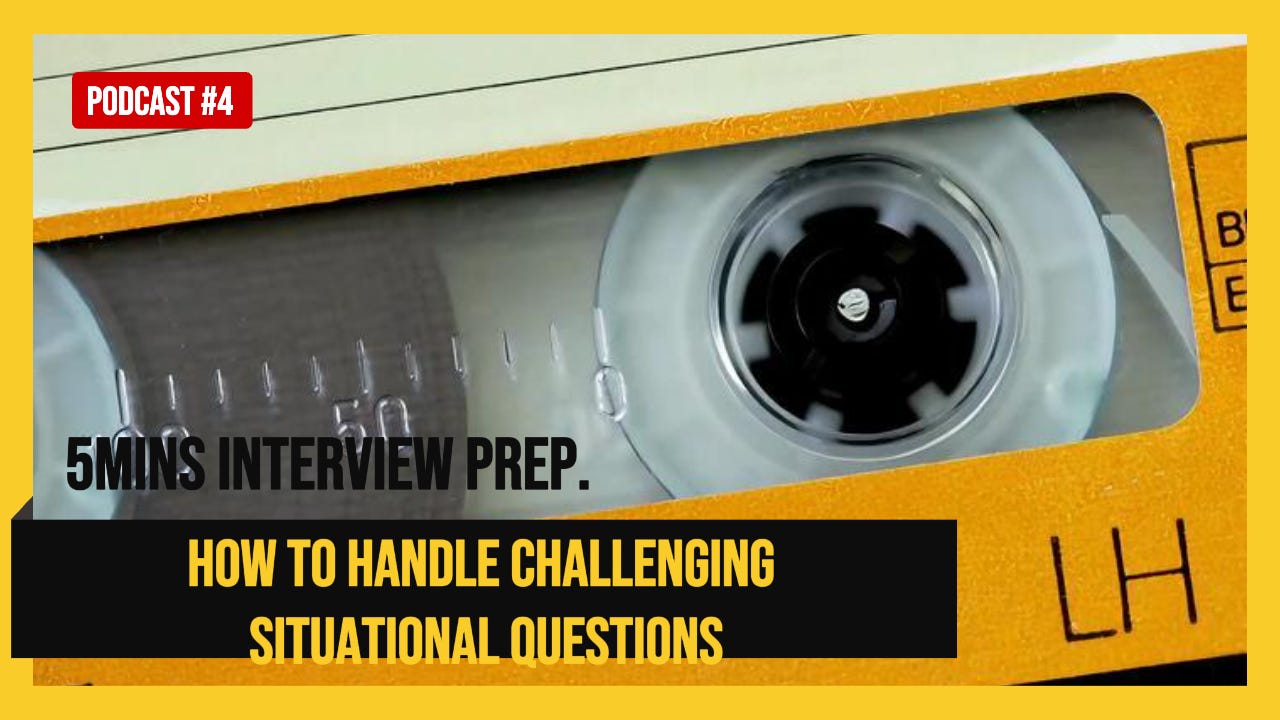Those dreaded hypothetical scenarios that interviewers spring on you when you least expect them...
"A customer placed an order months ago, but shipping issues mean we have no product to deliver and no inventory. We need to cancel the order. How would you handle this situation?"
If questions like this make you freeze or start rambling to sound impressive, you're not alone. Today's podcast episode tackles one of the most challenging aspects of global job interviews: situational case questions.
Episode Highlights
In this episode, we break down:
The difference between situational questions for entry-level vs. mid-level positions
A step-by-step framework for structuring your answers
A real-world complex scenario involving multiple stakeholders
A sample answer that demonstrates key qualities employers look for
The Challenging Scenario
Imagine yourself in this situation:
You're facilitating new hire onboarding
You support Manager Angela and her boss Cindy
Training is scheduled to end at 5 PM
Cindy requests a last-minute meeting
Angela is unavailable for guidance
You survey new hires; Jay cancels his paid English lesson to stay
Cindy cancels the meeting at 4:55 PM
Jay confronts you about his financial loss
Angela acknowledges but takes no action
You feel Angela often avoids responsibility
The question: "How would you handle this situation?"
A Winning Approach
The best answers to situational questions follow this structure:
Identify stakeholders and their interests
New hires (especially Jay who suffered a loss)
Manager Angela (who didn't provide direction)
Cindy (the senior manager)
Yourself (caught in the middle)
Define the core problem
Financial loss for Jay
Potential leadership gap
Threat to organizational credibility
Present a balanced solution
Immediate actions for Jay
Process improvements
Professional handling of Angela's behavior
Sample Answer
"In this situation, I'd take both immediate and long-term actions. First, I would speak privately with Jay to apologize for the inconvenience and offer to speak with his English tutor to explain the situation and possibly reschedule without a cancellation fee. If that's not possible, I would document the situation and speak with HR about potentially reimbursing Jay for his financial loss, as it occurred due to a work-related miscommunication.
Next, I would request a brief meeting with Angela to discuss what happened. Without assigning blame, I would suggest implementing a protocol for last-minute schedule changes, such as requiring at least 30 minutes' notice for mandatory after-hours meetings and having a clear chain of command for decision-making when key people are unavailable.
Additionally, I would propose creating a system where new hires could indicate their after-hours commitments in advance, allowing for better planning. Throughout this process, I would maintain professionalism and focus on solutions rather than personalities or blame.
For the long term, if Angela continues to avoid responsibility in similar situations, I would document these instances and consider discussing the pattern with HR or a trusted senior colleague, framing it as seeking advice on how to better support the team structure."
Why This Answer Works
This response demonstrates several key qualities interviewers look for:
Empathy - Acknowledging the impact on Jay
Problem-solving - Offering both immediate and systemic solutions
Professionalism - Focusing on processes, not blame
Forward-thinking - Suggesting preventative measures
Balance - Considering all perspectives
Your 5-Minute Practice
Take just 5 minutes to craft your own response:
Identify stakeholders and their concerns
Define what you believe is the core problem
Outline 2-3 specific actions you would take
Explain your reasoning briefly
Practice delivering your answer in 1-2 minutes
Record yourself and listen back to identify areas for improvement. The key isn't perfection, but developing a structured approach that showcases your problem-solving abilities.
About This Podcast
The English Interview Podcast provides 5-minute daily lessons to help you prepare for global job interviews. Each episode focuses on a specific interview challenge and provides actionable strategies you can implement immediately. Subscribe to receive new episodes directly in your inbox.
For Korean Subscribers 한국 구독자분들을 위한 특별 안내:
🇰🇷 한국어로 더 깊이 있는 인터뷰 준비를 원하시나요?
제 또 다른 퍼블리케이션 "못 푸는 문과생의 문제는 없습니다"도 방문해보세요!
이곳에서는 한국인 구독자분들을 위해 맞춤으로 더 생생하고, 재밌고, 자세한 영어 면접 팁, 구체적으로 한국 상황에 맞춘 실제 예시, 그리고 영어 면접을 위한 한국어 설명을 제공하며, 구독자님들의 ‘참여형’으로 진행되고 있습니다.
하루 5분만 투자하여, 불시에 파팍! 🔥 다가오는 해외취업 기회를 낚아채세요! 👉 지금 바로 구독하기













Share this post